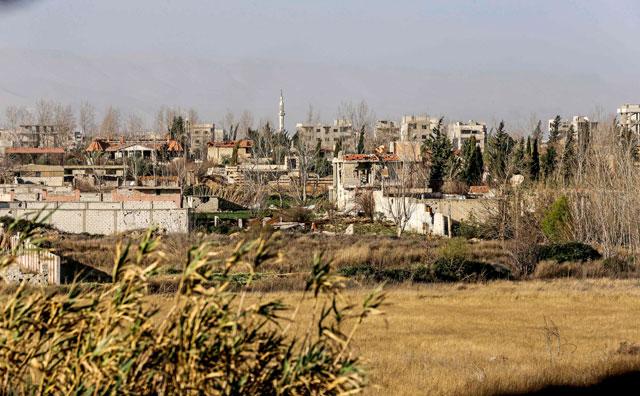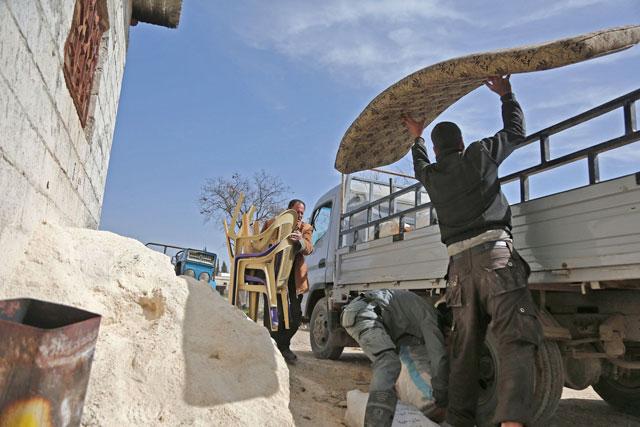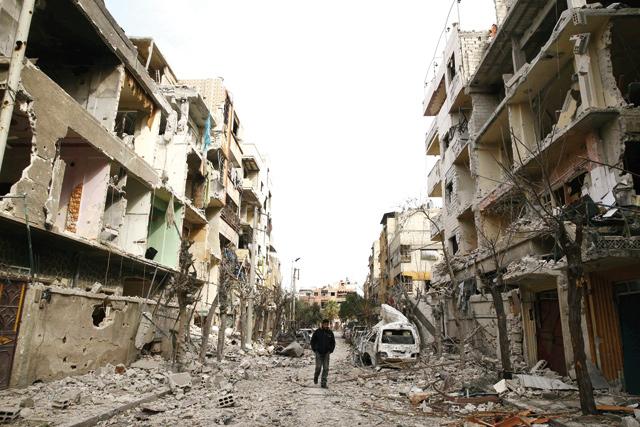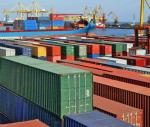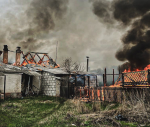You are here
UN pleads for truce to avert ‘massacre’ as strikes hit Syria's Ghouta for fifth day
By Reuters - Feb 23,2018 - Last updated at Feb 23,2018
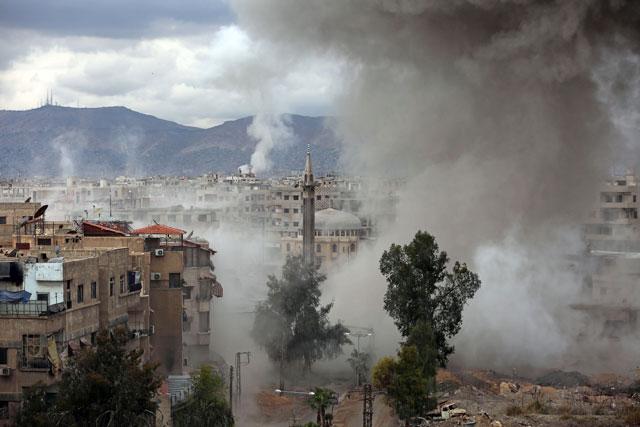
Smoke billows following Syrian government bombardments on Kafr Batna, in the besieged Eastern Ghouta region on the outskirts of the capital Damascus on Thursday (AFP photo)
AMMAN — Warplanes pounded the last rebel enclave near Syria's capital for a fifth day running on Thursday, as the UN Security Council considered demanding a 30-day truce across the country to allow emergency aid deliveries and medical evacuations.
The UN envoy for Syria, Staffan de Mistura, pleaded for a ceasefire to halt one of the fiercest air assaults of the seven-year civil war and prevent a "massacre" in the besieged Eastern Ghouta region on the outskirts of Damascus.
At least 403 people have been killed in Eastern Ghouta district since Sunday night, according to the Syrian Observatory for Human Rights war monitor, with more than 2,116 wounded from the assault by Syria's military and its allies.
Planes have struck residential areas in the enclave of 400,000 people and, said medical charities, hit more than a dozen hospitals, making it near impossible to treat the wounded.
Panos Moumtzis, the UN humanitarian coordinator for Syria, said households in Eastern Ghouta were without food, water or electricity in winter cold and 80 per cent of the population of the town of Harasta was living underground.
"There is a need for avoiding a massacre, because we will be judged by history," Mistura said, urging the 15-member Security Council to act. The Council was meeting on Thursday to discussion the situation at the request of Russia.
President Bashar Assad's main ally Russia, which wields a veto on the Security Council, said it could support a 30-day truce, but not one that included the Islamist militants it says the onslaught on Eastern Ghouta is meant to target.
Resolution
The Security Council was considering a resolution, drafted by Kuwait and Sweden, that demands "a cessation of hostilities throughout Syria for all military operations except those directed at the Islamic State [Daesh]... Al Qaeda and Al Nusra Front" for 30 days to allow aid deliveries and medical evacuations.
Swedish UN Ambassador Olof Skoog said he hoped the Security Council could vote on the resolution on Thursday. But Russian Ambassador Vassily Nebenzia said he would propose amendments to the text.
A resolution needs nine votes in favour and no vetoes by Russia, China, the United States, France or Britain to pass.
“The idea with the Security Council resolution is first and foremost stop the bombing and let aid get in ... The Russians can step up, will they?” a US official told Reuters.
Residents of Douma, the biggest town in Eastern Ghouta, described plumes of black smoke billowing from residential areas after planes dropped bombs from high altitude.
Searches were under way for bodies amid the rubble in the town of Saqba and elsewhere, said rescuers.
Sara Kayyali, Syria researcher for Human Rights Watch, said the situation in Eastern Ghouta was deteriorating “at an exponential rate” with over 250 civilians dead in the last 48 hours. “Witnesses that we are speaking to on the ground are saying that it’s ‘raining bombs’,” she told Reuters in Geneva.
Robert Mardini, Middle East regional director for the International Committee of the Red Cross, said the ICRC was poised to offer emergency medical care in the enclave, and carry out evacuations of wounded as soon as conditions permitted.
“We need to get clearance and acceptance by all sides to carry out our work. We have a convoy ready to be sent to Eastern Ghouta... as soon as there is reduction in the intensity of the fighting,” he told Reuters at a media briefing in Beirut.
In Syria’s north, where Turkey launched an offensive in the past month against a Kurdish militia, the Kurds said pro-government fighters were now deploying to front lines to help repel the Turkish advance, though assistance would be needed from the Syrian army itself.
Government forces also entered a part of Aleppo controlled by the Kurdish YPG militia, a witness and the observatory said, although the YPG denied this.
The Kurdish YPG — backed by the United States in other parts of Syria — have sought help recently from the Russian-backed Damascus government to resist the Turkish thrust, an example of the strange bedfellows in a multi-sided conflict that has drawn in neighbours and world powers.
Uphill
International attention is now focused on the humanitarian emergency in eastern Ghouta, where 400,000 people have been under siege for years and where government bombardments escalated sharply on Sunday, causing mass civilian casualties.
De Mistura said he hoped the Security Council would agree to a ceasefire resolution, but acknowledged it would be hard. “I hope it will. But it’s uphill. But I hope it will. It is very urgent,” he told Reuters at the United Nations in Geneva.
Moscow and Damascus say their assault on Eastern Ghouta is necessary to defeat rebels who have been firing mortars on the capital — government territory throughout the war.
“Those who support the terrorists are responsible for the situation in Eastern Ghouta,” Kremlin spokesman Dmitry Peskov told a conference call with reporters. “Neither Russia, nor Syria nor Iran are in that category of states, as they are waging an absolute war against terrorists in Syria.”
A White House statement said Washington backed the UN call for a ceasefire to allow access for aid and medical evacuations.
“The United States also calls upon Russia and its partners to live up to their obligations with respect to de-escalation zones, particularly those in Eastern Ghouta and to end further attacks against civilians in Syria.”
Aid workers and residents say Syrian army helicopters have been dropping “barrel bombs” — oil drums packed with explosives and shrapnel — on marketplaces and medical centres.
Residents and insurgents in Eastern Ghouta say Russian planes are also involved. Syrians say they can identify Russian aircraft because they fly at higher altitude than Syrian planes.
Damascus and Moscow deny using barrel bombs or hitting civilians. They say rebels hold civilians as human shields.
Video footage obtained by Reuters showed wreckage at the Al Shifa hospital in the town of Hammouriyeh. Staff said it had been hit by air strikes and artillery.
“The clinics department is out of service, the clinical care unit is out, the surgery unit is out, the incubator unit is out, the pediatric section is out, all of the departments of the hospital are completely out of service,” a man identified as a
medical worker said.
“There were casualties among our staff, among patients, among the children we had,” he said, adding that doctors had performed an operation in the rubble because it was impossible to evacuate in time.
Scorched earth
Opposition-held Eastern Ghouta has been under siege by the Syrian army and allied forces since 2013. After government gains since 2015, it is the final rebel bastion near the capital.
Along with Idlib province in the north, part of Aleppo province and a strip in Syria’s southwest, it is one of just a handful of areas left where large numbers of people remain in territory controlled by fighters seeking to overthrow Assad. The president has vowed to regain control of every inch of Syria.
Residents and opposition figures say the Syrian government and its allies are deliberately harming civilians with a “scorched earth policy” to force rebels to surrender.
“They want to break our will and turn Ghouta into another Aleppo but this is their dream,” Yusef Dughmi, a resident in the devastated Eastern Ghouta town of Arbin, said overnight.
Related Articles
HAMMOURIYA, Syria — Syrian forces pursued a relentless air and ground offensive against Eastern Ghouta on Thursday, moving closer to retakin
GENEVA — A Russian plan for a five-hour pause in fighting in Syria’s Eastern Ghouta needs to be expanded to allow aid deliveries to enter an
DOUMA, Syria — New regime air strikes and heavy clashes shook Syria's rebel enclave of Eastern Ghouta on Sunday despite a UN demand for a ce


